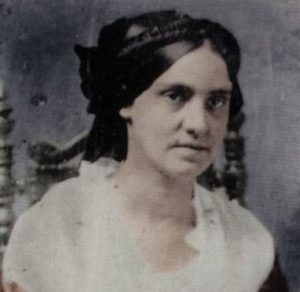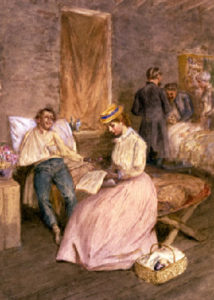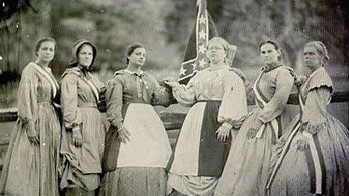To end our hospital blogs and turn our focus to Women’s History Month which is March, we are going to discuss Phoebe Pember. She was one of the many Civil War women who served as nurses to the wounded and sick soldiers. During the course of the war, more than 15,000 patients came under her care. Last year we learned about Kate Cumming and Dr. Mary Walker, who also are featured in exhibits at the Heritage Center.
Phoebe Pember was born Phoebe Levy in 1823 in Charleston, South Carolina. The 4th of seven children, she was raised in a wealthy and socially prominent Jewish family; her father, Jacob Levy, was a successful merchant, her mother, Fanny Yates was also from a wealth Jewish family. The Levys were major supporters of the Confederate cause, one of her sisters, Eugenia, was even arrested for her display of this support. Phoebe received some formal schooling before her 1856 marriage to Bostonian Thomas Pember. He died soon after their marriage and by late 1861 she was a childless widow, living with her parents in Marietta, Georgia where they had fled to escape the ravages of war.

Phoebe Pember
Contributed: American Battlefield
Phoebe was not happy living at home and decided she needed to be involved more in the Confederate effort. This prompted her to accept an offer from her friend, Mary Pope Randolph, for the position of chief matron of one of the five divisions at Chimborazo Hospital in Richmond, Virginia in November 1862. In September that same year, the Confederate States Congress had passed The Hospital Bill, enabling women to become matrons at Confederate hospitals to “exercise a superintendence over the entire domestic economy of the hospital, to take charge of such delicacies as may be provided for the sick; to apportion them out as required, to see that the food or diet is properly prepared, and all such other duties as may be necessary.” Starting her new post in December, Phoebe now oversaw part of one of the largest military hospitals in the world.

A model of Chimborazo Hospital as it looked in 1865.
Contributed: John Murden
It was an unusual job for a woman, at a time when most nursing was done by men. Pember’s varied duties surely required what one of her contemporaries described as her “will of steel under a suave refinement.” Lacking adequate food, medicine, and other supplies, often that warm presence was the best that Pember and her staff could offer. Although she dedicated herself to relieving the suffering of soldiers, she was often simply a final companion for the dying.
Phoebe wrote about her nursing experience in her book “A Southern Woman’s Story: Life in Confederate Richmond”. One story she told was about a young soldier who had suffered a badly broken bone in his upper thigh, but he was healing and expected to make a recovery. One night, he rolled over in bed and screamed. Phoebe came running and found that a bone splinter had poked out through his skin, and the wound was jetting blood (an artery had been severed). Thinking quickly, she pressed on the wound with her finger and was able to cut off the flow of blood until a surgeon arrived. Sadly, the surgeon arrived and found that he could not locate the severed artery, and told Phoebe there was no hope for him to live. She was left to break the news to the wounded man. Heartbroken, she recalled the conversation:
“It was done at last and the verdict received patiently and courageously, some directions given by which his mother would be informed of his death, and then he turned his questioning eyes upon my face.
‘How long can I live?’
‘Only as long as I keep my finger upon this artery.’ A pause ensued. God alone knew what thoughts hurried through that heart and brain, called so unexpectedly from all earthly hopes and ties. He broke the silence at last.
‘You can let go.’
But I could not. Not if my own life had trembled in the balance. Hot tears rushed to my eyes, a surging sound to my ears, and a deathly coldness to my lips. The pang of obeying him was spared me, and for the first and last time during the trials that surrounded me for four years, I fainted away.”
Pember remained at Chimborazo hospital for three years, performing a multitude of duties. She oversaw everything from dietary needs to the supervision of whiskey used for medical purposes — something that resulted in numerous battles. Her incredibly strict guarding of the whiskey created many arguments. She was confronted by the ward surgeon, and also had a conflict with a patient that she eventually had to threaten with a gun. “The monthly barrel was an institution and a very important one,” Pember wrote. “Indeed, if it is necessary to have a hero for this matter-of-fact narrative the whiskey barrel will have to step forward and make his bow.” Whiskey helped keep men alive, and Pember did everything in her power to make sure the “tempted” surgeons never got their hands on it.

“Hospital, 1861”
Artist: William Ludwell Sheppard
On April 3, 1865, after the Confederate government evacuated Richmond, Chimborazo Hospital surrendered to the U.S. Army. Phoebe remained at the hospital and cared for the remaining Confederate soldiers, as well as the Union soldiers that had been moved there. When the war ended, Pember maintained her elite social status, and traveled extensively through the United States and Europe. Publishing her memoirs in 1879. Her last years, were lived with her niece in Pittsburgh, Pennsylvania. Phoebe died on March 4, 1913 of breast cancer at the age of 90. She is buried in Laurel Grove Cemetery in Savannah, Georgia.

Phoebe Pember served unselfishly during the war, and had many exciting experiences. Pember’s memoirs A Southern Woman’s Story: Life in Confederate Richmond recounts her time at Chimborazo and provides valuable insight into the plight of southern women during the Civil War. Pember defied gender expectations and excelled in her position as administrator. Definitely earning her place in being remembered this Women’s History Month.





